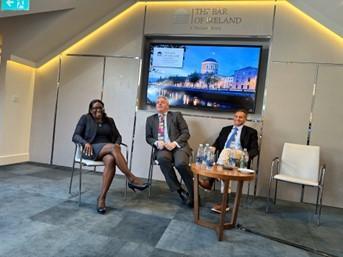I Love Our Diversity
By Daniel M. Kotin
I recently returned from a Chicago Bar Association trip to Dublin, Ireland hosted by my partner and CBA President Tim Tomasik.
 While there, I participated on a panel with Judge Maryam Ahmed and Barrister Remy Farrell, comparing the jury trial system in the U.S. to that in Ireland. We learned that in jury selection, like in America, Irish barristers are given a number of “preemptory challenges” through which they can exclude potential jurors for no stated reason.
While there, I participated on a panel with Judge Maryam Ahmed and Barrister Remy Farrell, comparing the jury trial system in the U.S. to that in Ireland. We learned that in jury selection, like in America, Irish barristers are given a number of “preemptory challenges” through which they can exclude potential jurors for no stated reason.
At this point, our moderator, Hon. Tom Mulroy (Ret.) asked the Barrister how they handle Batson issues in Ireland. (Batson v. Kentucky was the first in a line of U.S. Supreme Court cases holding it unconstitutional for a lawyer to remove jurors from a case on the basis of their race, religion, or ethnic background.) This is a complicated issue in American courts, and it was a good question to ask of our Irish counterpart.
Barrister Farrell gave an answer that was refreshingly honest. “We’re a pretty homogeneous lot over here,” he said. “There isn’t really that type of discrimination to be had.” His blunt answer drew a laugh from the audience of American lawyers and judges. Only afterward did its simplicity cause me to think.
Nearly 95% of the population of Ireland is white. Nearly 80% of them identify as Catholic. So, an Irish jury will inevitably be made up of 12 white, Catholic men and women, as will the lawyers, as will the judge, as will the parties on trial.
Here, on the other hand, there is nothing that exemplifies America as the “melting pot” of the world more than the diversity found in our big city juries, particularly cities like Chicago.
When returning from the jury selection phase of a trial here, I’ll inevitably be asked by colleagues to describe the jury that was just seated. I might respond by explaining that we have three African Americans, three Latinos, two Polish women, an Irish guy, and a Middle Eastern Islamic woman. Will certain members of that jury tend to relate better to my client than to the opponent? Hopefully. Will other members of the jury tend to negate that bias and lean the other way? Probably. The great thing about our system is that these 12 people, all from different ancestral countries, with different faiths, and different cultural biases, will come together in the end and return a unanimous verdict either for or against my client.
It is our diversity that makes our jury system so vitally important to the right to a fair trial in America. It is a privilege to live in this ecosystem in which we are all unique. I am grateful to say that we are not “a pretty homogeneous lot.”
TKK blog Center
November 19, 2025 in Medical Malpractice
Botched Abdominal Surgeries Lead to Lifelong GI Tract Issues
Read MoreOctober 16, 2025 in Personal Injury
How Can a Personal Injury Attorney Help After a Refinery Accident?
Read More









